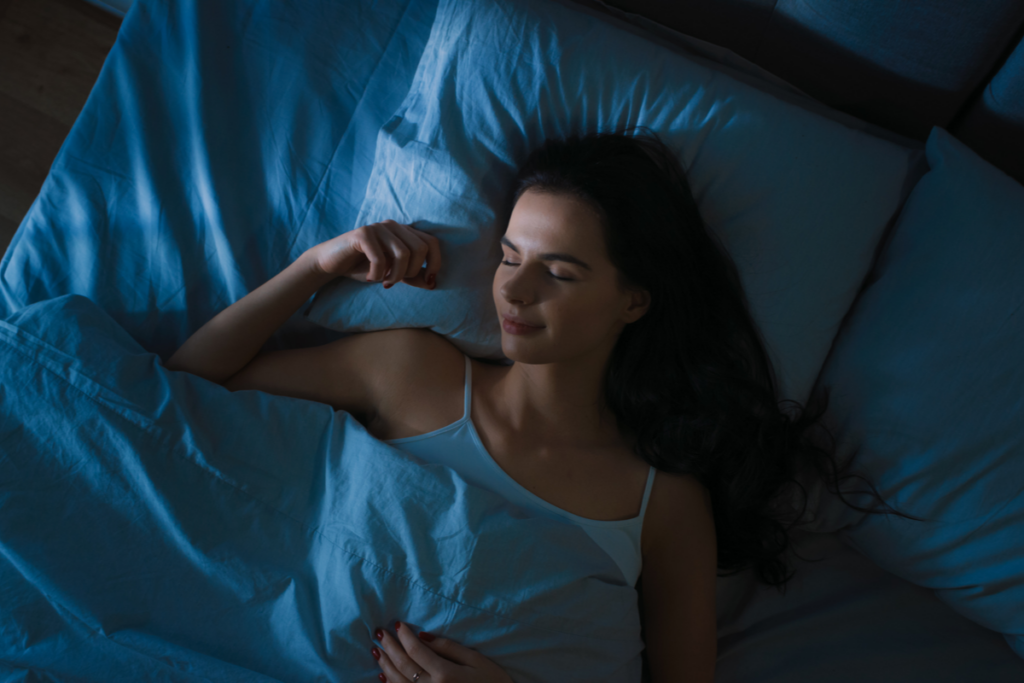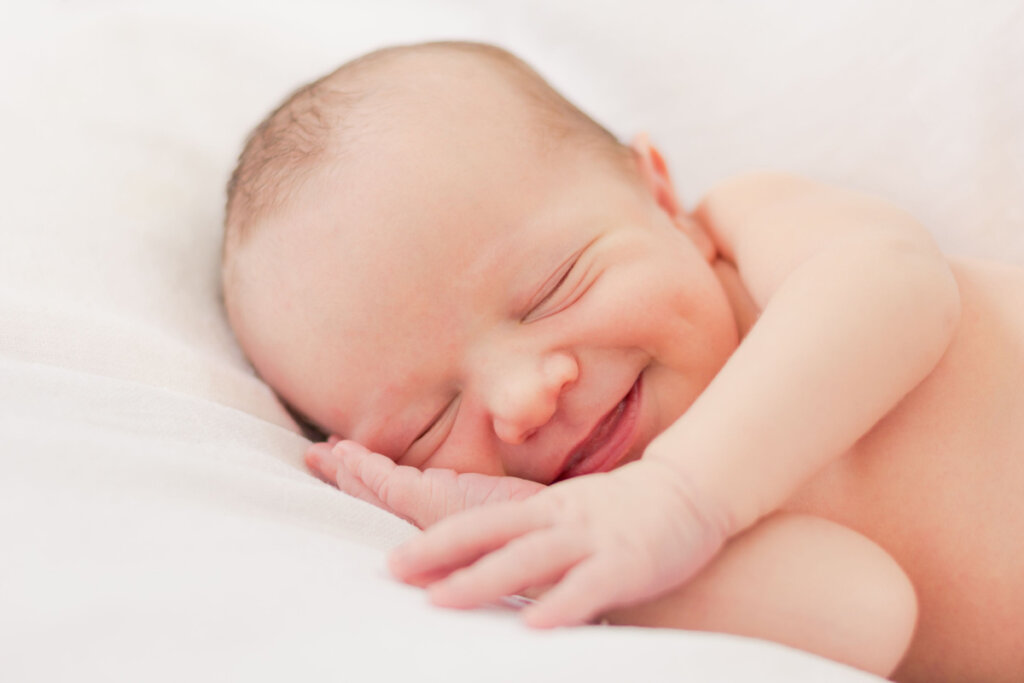How Much Sleep You Need Varies According to Your Age


Written and verified by the psychologist Elena Sanz
Sleep is a basic physiological need. It’s known that, after a few days without sleep, the body begins to fail severely. Even partial sleep deprivation can have significant negative effects on cognitive performance, mood, and daily functioning.
Despite this, many people don’t get enough rest, either because they can’t or because they don’t know their body’s requirements. For this reason, today we’re going to explain how much sleep you need according to your age.
It’s worth mentioning that it’s not only the amount of daily sleep that’s important but also the quality. In fact, rest must be deep, restorative, and continuous so that the mind and body can be restored. However, there are various parasomnias that can affect this process (such as sleepwalking, nightmares, or sleep apnea). Even high levels of stress can lead to poor-quality, fragmented sleep.
Beyond this, trying to rest for the necessary hours is a basic recommendation for health. So, what’s appropriate? Is the pattern the same for all people? What does it depend on? We answer these questions below.

What does science say about sleep and rest?
You’ve probably heard many recommendations in this regard from experts and non-experts. That said, they may not always coincide.
It’s generally believed that people need eight hours of sleep a day, but there are those who maintain that six is enough to function properly. Yet, in reality, each individual’s requirements are different and, although the guidelines are indicative, each case requires individualized attention.
Moreover, it’s evident that the need for sleep varies with age and maintains an inverse relationship. For instance, although babies and children need more sleep, older adults seem to need less rest. Fortunately, there’s a growing body of research in this regard. Here are some of the most important findings:
Six hours of sleep isn’t enough
As we mentioned earlier, there’s a fairly widespread belief that six hours of sleep is an acceptable minimum for an adult. However, research published in the journal, Sleep casts doubt on this.
A sleep deprivation study assigned participants to three different conditions: four, six, or eight hours of sleep, to be maintained for 14 consecutive days. There was also a group that underwent complete sleep deprivation for three days.
The participants’ subjective ratings of sleepiness were assessed, as well as their cognitive performance. The results were compelling. It was observed that, although those who slept for six hours didn’t say they felt tired or sleepy, their cognitive performance showed increasing deficits. As a matter of fact, it was comparable to those who underwent total sleep deprivation.
Oversleeping can be negative
Although we’re usually aware of how harmful it is to not get enough rest, it’s often not recognized that excessive sleep can also have a negative effect. This is suggested by a longitudinal analysis conducted by scientists from the United Kingdom and China and published in the journal, Natural Aging.
The study evaluated the sleep patterns, mental health, and well-being of participants between the ages of 38 and 73. It concluded that seven is the optimal number of hours that an adult person should rest.
It seems that excessive or insufficient sleep could be related to a decrease in cognitive function and a greater presence of symptoms of anxiety and depression. In addition, in older adults, it seems to be a particularly relevant risk factor for cognitive deterioration and for the appearance of Alzheimer’s and other dementias.
How much sleep you need varies according to your age
Studies such as the above act as guidelines regarding the ideal amount of sleep required. However, these recommendations are always mediated by the individual’s age. The National Sleep Foundation has written a report, endorsed by a large panel of experts, that provides some basic guidelines to consider.
How much sleep you need according to your age:
- Newborns: Between 0 and 3 months, a baby needs to sleep between 13 and 17 hours a day.
- Babies: From four to eleven months, ideally, between 12 and 15 hours of sleep are required. Although the acceptable range can vary between 11 and 18 hours.
- Toddlers. Between one to two years old, eleven to 14 hours of sleep is recommended.
- Preschoolers. For children between three and five years old, the ideal is between ten and 13 hours of rest.
- School-age children. From six to 13 years old, children should sleep about nine-eleven hours each night.
- Adolescents: Between 14 and 17 years of age, adolescents should sleep between eight and ten hours.
- Young adults and adults. Seven-nine hours is ideal for adults ages 18-64.
- Older adults. Those over 65 years should rest for seven-eight hours to stay healthy.

Take your own needs into account
As you can see, the previous guidelines cover relatively wide ranges, since they’re only indicative. In fact, each individual, depending on their habits, lifestyle, and even genetics has different rest needs. Even in the same person, they vary with age.
Beyond rigidly adhering to these guidelines, it’s important that you evaluate yourself on an individual basis. If you’re getting the right amount of rest, you should be able to wake up naturally in the morning (no need for an alarm clock), feel rested and recharged, and be able to function properly throughout the day.
On the other hand, if you experience excessive sleepiness, irritability, moodiness, lack of concentration, or memory difficulties, you may need to make changes to your sleeping habits. Therefore, don’t hesitate to seek professional help if you need to.
Sleep is a basic physiological need. It’s known that, after a few days without sleep, the body begins to fail severely. Even partial sleep deprivation can have significant negative effects on cognitive performance, mood, and daily functioning.
Despite this, many people don’t get enough rest, either because they can’t or because they don’t know their body’s requirements. For this reason, today we’re going to explain how much sleep you need according to your age.
It’s worth mentioning that it’s not only the amount of daily sleep that’s important but also the quality. In fact, rest must be deep, restorative, and continuous so that the mind and body can be restored. However, there are various parasomnias that can affect this process (such as sleepwalking, nightmares, or sleep apnea). Even high levels of stress can lead to poor-quality, fragmented sleep.
Beyond this, trying to rest for the necessary hours is a basic recommendation for health. So, what’s appropriate? Is the pattern the same for all people? What does it depend on? We answer these questions below.

What does science say about sleep and rest?
You’ve probably heard many recommendations in this regard from experts and non-experts. That said, they may not always coincide.
It’s generally believed that people need eight hours of sleep a day, but there are those who maintain that six is enough to function properly. Yet, in reality, each individual’s requirements are different and, although the guidelines are indicative, each case requires individualized attention.
Moreover, it’s evident that the need for sleep varies with age and maintains an inverse relationship. For instance, although babies and children need more sleep, older adults seem to need less rest. Fortunately, there’s a growing body of research in this regard. Here are some of the most important findings:
Six hours of sleep isn’t enough
As we mentioned earlier, there’s a fairly widespread belief that six hours of sleep is an acceptable minimum for an adult. However, research published in the journal, Sleep casts doubt on this.
A sleep deprivation study assigned participants to three different conditions: four, six, or eight hours of sleep, to be maintained for 14 consecutive days. There was also a group that underwent complete sleep deprivation for three days.
The participants’ subjective ratings of sleepiness were assessed, as well as their cognitive performance. The results were compelling. It was observed that, although those who slept for six hours didn’t say they felt tired or sleepy, their cognitive performance showed increasing deficits. As a matter of fact, it was comparable to those who underwent total sleep deprivation.
Oversleeping can be negative
Although we’re usually aware of how harmful it is to not get enough rest, it’s often not recognized that excessive sleep can also have a negative effect. This is suggested by a longitudinal analysis conducted by scientists from the United Kingdom and China and published in the journal, Natural Aging.
The study evaluated the sleep patterns, mental health, and well-being of participants between the ages of 38 and 73. It concluded that seven is the optimal number of hours that an adult person should rest.
It seems that excessive or insufficient sleep could be related to a decrease in cognitive function and a greater presence of symptoms of anxiety and depression. In addition, in older adults, it seems to be a particularly relevant risk factor for cognitive deterioration and for the appearance of Alzheimer’s and other dementias.
How much sleep you need varies according to your age
Studies such as the above act as guidelines regarding the ideal amount of sleep required. However, these recommendations are always mediated by the individual’s age. The National Sleep Foundation has written a report, endorsed by a large panel of experts, that provides some basic guidelines to consider.
How much sleep you need according to your age:
- Newborns: Between 0 and 3 months, a baby needs to sleep between 13 and 17 hours a day.
- Babies: From four to eleven months, ideally, between 12 and 15 hours of sleep are required. Although the acceptable range can vary between 11 and 18 hours.
- Toddlers. Between one to two years old, eleven to 14 hours of sleep is recommended.
- Preschoolers. For children between three and five years old, the ideal is between ten and 13 hours of rest.
- School-age children. From six to 13 years old, children should sleep about nine-eleven hours each night.
- Adolescents: Between 14 and 17 years of age, adolescents should sleep between eight and ten hours.
- Young adults and adults. Seven-nine hours is ideal for adults ages 18-64.
- Older adults. Those over 65 years should rest for seven-eight hours to stay healthy.

Take your own needs into account
As you can see, the previous guidelines cover relatively wide ranges, since they’re only indicative. In fact, each individual, depending on their habits, lifestyle, and even genetics has different rest needs. Even in the same person, they vary with age.
Beyond rigidly adhering to these guidelines, it’s important that you evaluate yourself on an individual basis. If you’re getting the right amount of rest, you should be able to wake up naturally in the morning (no need for an alarm clock), feel rested and recharged, and be able to function properly throughout the day.
On the other hand, if you experience excessive sleepiness, irritability, moodiness, lack of concentration, or memory difficulties, you may need to make changes to your sleeping habits. Therefore, don’t hesitate to seek professional help if you need to.
All cited sources were thoroughly reviewed by our team to ensure their quality, reliability, currency, and validity. The bibliography of this article was considered reliable and of academic or scientific accuracy.
- Hirshkowitz, M., Whiton, K., Albert, S. M., Alessi, C., Bruni, O., DonCarlos, L., … & Ware, J. C. (2015). National Sleep Foundation’s updated sleep duration recommendations. Sleep health, 1(4), 233-243.
- Lee, S. (2022). Naturally occurring consecutive sleep loss and day-to-day trajectories of affective and physical well-being. Annals of Behavioral Medicine, 56(4), 393-404.
- Li, Y., Sahakian, B. J., Kang, J., Langley, C., Zhang, W., Xie, C., … & Feng, J. (2022). The brain structure and genetic mechanisms underlying the nonlinear association between sleep duration, cognition and mental health. Nature Aging, 2(5), 425-437.
- Van Dongen, H., Maislin, G., Mullington, J. M., & Dinges, D. F. (2003). The cumulative cost of additional wakefulness: dose-response effects on neurobehavioral functions and sleep physiology from chronic sleep restriction and total sleep deprivation. Sleep, 26(2), 117-126.
This text is provided for informational purposes only and does not replace consultation with a professional. If in doubt, consult your specialist.







